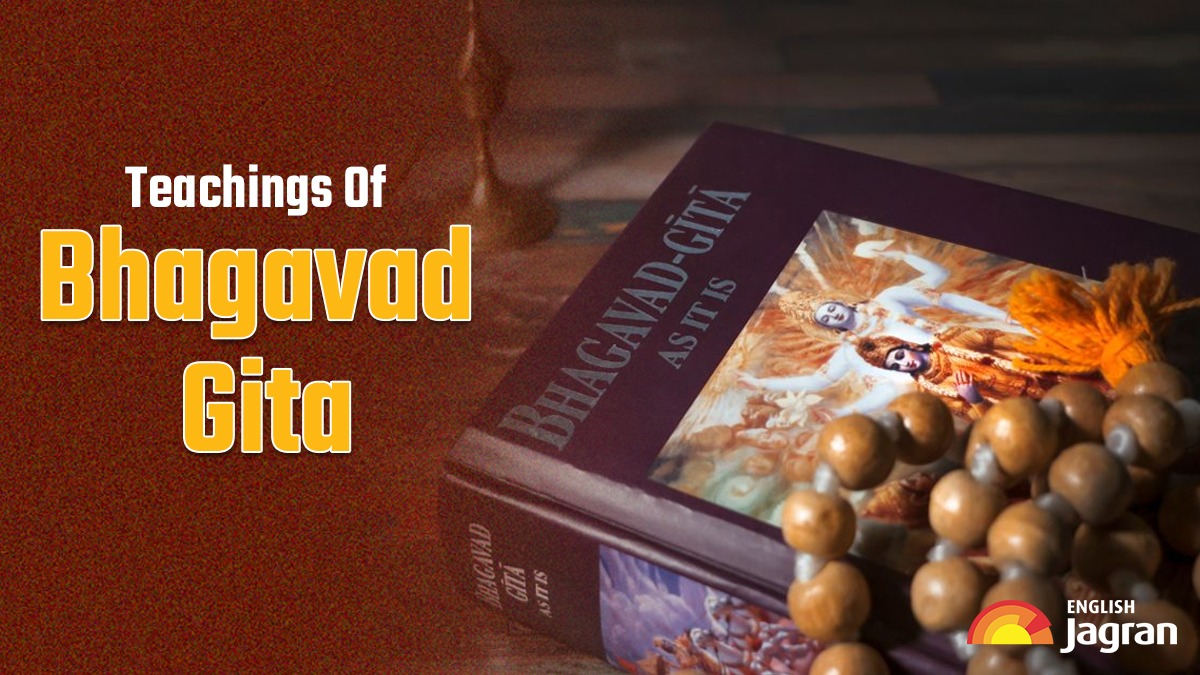- By Kashish Rai
- Thu, 03 Aug 2023 06:40 PM (IST)
- Source:JND
The Srimad Bhagavad Gita (also known as the God’s Song) is a revered Hindu scripture that proceeds from chapters 23 to 40 of the sixth book of the epic Mahabharata. The Bhagavad Gita was written around 5000 years ago by sage Ved Vyasa and is divided into 18 chapters and contains 700 verses in Sanskrit that elucidate the philosophy of life and self-realisation.
This scripture also known as “Gitopnisad” was spoken by Lord Krishna to his close friend and the Pandava warrior prince Arjuna on the Battlefield of Kurukshetra while he was deluded with self-doubt and fear. Lord Krishna gave Arjuna the tremendous fortitude he needed to overcome all of his worries, doubts, and apprehensions in order to triumph on the battlefield.
Regardless of a person's nation or religion, the Bhagavad Gita's teachings are universally applicable to all. It is not a religious text that only applies to a particular societal group. The Bhagavad Gita teaches us how to live our lives in the proper way. The Bhagavad Gita's main goal is to free people from their present-day misery. Each individual faces challenges in a variety of ways, much like Arjuna did when he had to participate in the Battle of Kurukshetra. Here are a few inspiring verses from the Bhagavad Gita that will help you overcome all of these obstacles and succeed in life.
1. Bhagavad Gita, Chapter 2, Verse 14 :
मात्रास्पर्शास्तु कौन्तेय शीतोष्णसुखदु: खदा: |
आगमापायिनोऽनित्यास्तांस्तितिक्षस्व भारत ||2.14||
mātrā-sparśhās tu kaunteya śhītoṣhṇa-sukha-duḥkha-dāḥ
āgamāpāyino ’nityās tans-titikṣhasva bhārata
Meaning: O son of Kunti, the contact between the senses and the sense objects gives rise to fleeting perceptions of happiness and distress. These are non-permanent and come and go like the winter and summer seasons. O descendent of Bharat, one must learn to tolerate them without being disturbed.
In this passage, Lord Krishna teaches that nothing in this world is eternal. The happy and unhappy circumstances will change over time, just like the weather. As a result, one must patiently learn to put up with them without being impacted by those circumstances.

2. Bhagavad Gita, Chapter 2, Verse 47 :
कर्मण्येवाधिकारस्ते मा फलेषु कदाचन |
मा कर्मफलहेतुर्भूर्मा ते सङ्गोऽस्त्वकर्मणि ||2. 47||
karmaṇy-evādhikāras te mā phaleṣhu kadāchana
mā karma-phala-hetur bhūr mā te saṅgo ’stvakarmaṇi
Meaning: You have a right to perform your prescribed duties, but you are not entitled to the fruits of your actions. Never consider yourself to be the cause of the results of your activities, nor be attached to inaction.
This verse directs us to carry out our responsibilities honestly, without worrying about the results because pain is unable to avoid if the outcome does not meet your expectations. We liberate ourselves from worries and expectations by distancing ourselves from the results of our actions.
Also Read: 10 Spiritual Bhagavad Gita Quotes To Seek Inspiration And Wisdom
3. Bhagavad Gita, Chapter 2, Verse 70 :
आपूर्यमाणमचलप्रतिष्ठं
समुद्रमाप: प्रविशन्ति यद्वत् |
तद्वत्कामा यं प्रविशन्ति सर्वे
स शान्तिमाप्नोति न कामकामी ||2. 70||
āpūryamāṇam achala-pratiṣhṭhaṁ
samudram āpaḥ praviśhanti yadvat
tadvat kāmā yaṁ praviśhanti sarve
sa śhāntim āpnoti na kāma-kāmī
Meaning: Just as the ocean remains undisturbed by the incessant flow of waters from rivers merging into it, likewise the sage who is unmoved despite the flow of desirable objects all around him attains peace, and not the person who strives to satisfy desires.
There are numerous streams of water that enter a deep, gigantic ocean. The ocean always remains tranquil and unperturbed, regardless of how many streams enter it with a strong force. Similarly, a person with a steady understanding has all of these "thoughts, wants, expectations, and aspirations" (rivers) flowing through his or her "mind" (ocean) but does not let them affect or bother him or her.

